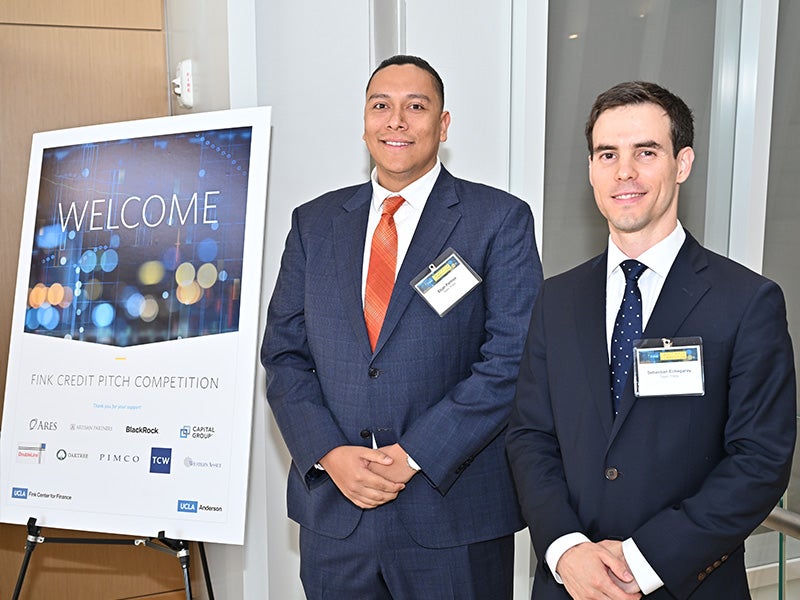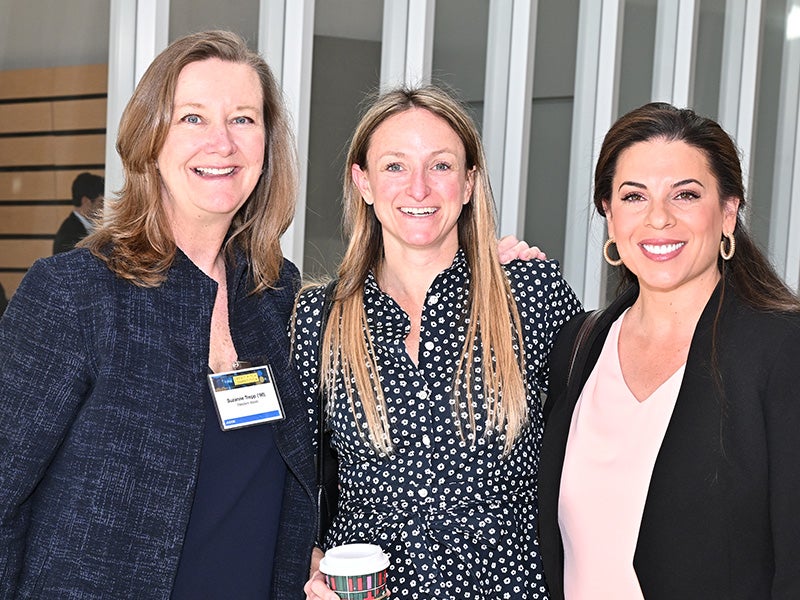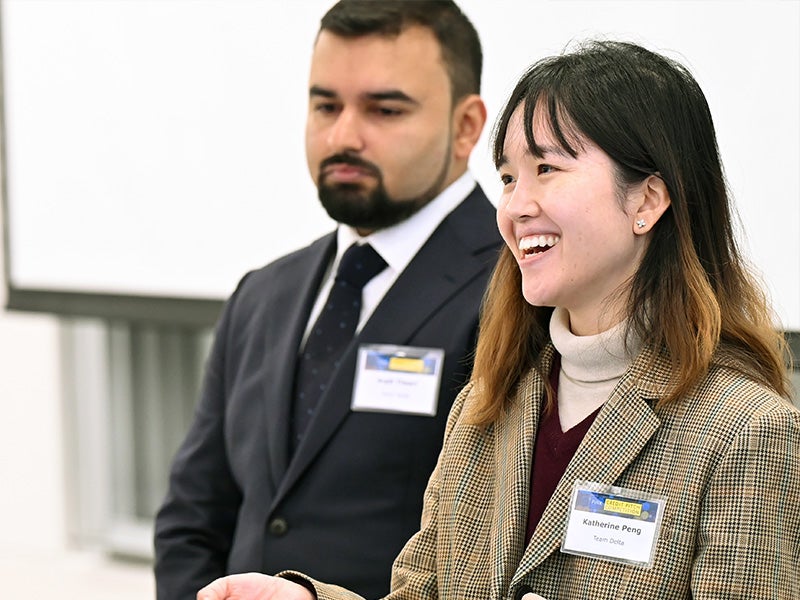UCLA Anderson’s Credit Pitch Competition Holds Tangible Value
UCLA Anderson’s Credit Pitch Competition Holds Tangible Value
The Fink Center’s annual event draws MBA students from as far away as London
December 20, 2023

- UCLA Anderson’s annual Fink Credit Pitch Competition offers MBA students worldwide a chance to compete
- While many business schools host stock pitch competitions, it’s less common to find competitions focused on credit
- First-year student Elijah Pantoja (’25) was drawn to the competition for the chance to pitch a real investment, not a case study
When Elijah Pantoja (’25) started as a full-time MBA student at UCLA Anderson in fall 2023, he had his eye on a long-term goal of working in finance.
With a background working in higher education, he thought he might first need to pivot to consulting. But after talking with his advisor, Pantoja realized he could move more directly into finance and investment management. One way to help him prepare, he was told, was to enter UCLA Anderson’s annual Fink Credit Pitch Competition, which was held in early November.
He decided to go for it.
For the premier credit pitch competition in the U.S., teams of students come to Anderson from b-schools as far away as London to pitch a credit investment idea to a panel of judges who themselves work in investment management. Representatives from such companies as BlackRock, DoubleLine, Oaktree Capital Management, PIMCO, Capital Group, TCW and Ares Management also attend, giving students an opportunity to network and impress.

Elijah Pantoja (’25) (left) and teammate Sebastian Hartmann (’25)
Leading up to the competition, Pantoja and his team spent an intense three-week period developing their pitch — a bond issued by Carnival Cruise Line that should be paid back in 2027. They reached out to the company’s investor relations team as well as a contact at Moody’s Investors Service who covers Carnival and could provide insights into the bond. They also dug into metrics on how to evaluate credit and what the risks of their investment idea would be.
In the end, Pantoja’s team didn’t place first, but the experience proved invaluable and reinforced his desire to work in investment management.
“I thought that the credit pitch was not only a good addition to my resume, but also a good opportunity to think through actual investment decisions,” he says. “What drew me to this competition was getting that real-world tangible experience.”
The Fink Credit Pitch Competition started in 2017. While many business schools host stock pitch competitions, it’s less common to find competitions focused on credit. In these competitions, students pitch an investment in debt instead of equity, such as corporate bonds that allow businesses to expand. It’s a much larger market than the equity market and an important source of capital for firms.
Lori Santikian, faculty director of the Fink Center for Finance and an adjunct associate professor, says Anderson was an ideal fit given its location in Los Angeles, a global hub of fixed income investment firms. Students first had the idea for the competition, and the Fink Center has elevated it to the global event it is today.
“We haven’t seen any credit pitch competitions that are at this level in terms of attracting a critical mass of top business schools and also a critical mass of top fixed income investment firms,” Santikian says.

Left to right: Judges Suzanne Trepp (’98) of Western Asset Management Co. and Linday Berz of Oaktree Capital Management, and Fink Center faculty director Lori Santikian
The competition offers students an opportunity to learn about credit concepts and hone their skills in a way that’s difficult to replicate in the classroom. Anderson alumnus Kevin Bekas (B.A. ’07, ’15) has been a judge for the competition from its start, and he values it for its real-world applicability.
After he graduated from Anderson, Bekas worked as a credit analyst for DoubleLine and in 2023 was promoted to director of corporate credit research. He said pitching credit investment ideas is one of his core job functions — and one students will be doing from the moment they start interviewing.
“It’s not a case study, and it’s not a manufactured situation,” Bekas says. “This is a real investment. And anyone could turn around and actually execute the recommendations being made by the participants. In theory, if we really liked one of their pitches, I could go out and buy that bond the next day or sell that bond the next day. This is live ammo.”
When judging the competition, Bekas says he looks for several measures of success. This includes the basics, such as whether the teams are using the right set of tools to evaluate credit investments (rather than equity or real estate). He then looks for whether they have a good understanding of the company and its risks in terms of investment.
Suzanne Trepp (’98) is another longtime judge of the competition. She said the winning teams often present a pitch that’s very close to what she would expect to see in a professional environment, which includes looking at the investment from all sides.
“Our goal is to make sure that they’ve considered not only the business model, but all the risk factors,” Trepp says. “Where does the bond rank within the capital structure? What about the bond covenants? How can value potentially be siphoned away from bond investors?”
The judges also evaluate the teams’ own modeling, making sure it shows certain metrics like EBITDA (earnings before interest, tax, depreciation and amortization). This helps them assess the risk and determine whether the issuer of the bond can actually pay back the debt.
Pantoja’s teammate Sebastian Hartmann Echegaray (’25) came into the competition with experience in modeling, which gave Pantoja and fellow teammate Yousra El-Alaoui (’25) an opportunity to learn more of the technical skills that come with a job in investment management. In between rounds of the competition, judges offered feedback on how teams could improve their models.
The competition also offered ample time for networking, during which Pantoja started conversations with the judges and some of the firms represented there. He has followed up with several for informal coffee chats.
Trepp says her firm, Western Asset Management Co., where she works as a research analyst, hired an Anderson alumnus two years ago based, in part, on his performance at the credit pitch competition.
“The competition is obviously a networking opportunity,” she says. “Students hone their own skills by getting up and presenting in real time to investors who are also potential employers. So it’s almost like they’re interviewing while they’re presenting.”
The credit pitch competition is typically for first-year MBA students. While it can feel like a rush to prepare for the competition so soon after starting classes, Katherine Peng (’24) says it sets students on the right track to get into investment management. Peng, who was awarded the Fink Center’s Kayne Investment Management fellowship, participated in the competition last year, with her team coming in second place. After she graduates, she has a job lined up with Apollo Global Management working on their private credit team.
Peng came into business school knowing she wanted to go into credit and fixed income, and she chose Anderson — and its alumni network — because of that. She credits her participation in the competition for much of what followed in her career.

Katherine Peng (’24) (right) and teammate Arpit Tiwari (’24)
“It was the single most important part of the recruiting process as a first-year,” she said. “Going through the process of putting together a pitch, trying to figure out what company you’re going to pitch and research, and then going through the motions of all the things you would do as a real research analyst — it becomes a course in and of itself.”
Peng recommended participating in the competition to any first-year student she spoke to this year, and she stayed around to help out on the day of.
Though Pantoja has only been at Anderson for one quarter, he already feels that he’s on a good path toward reaching his own career goals. Right after the competition, he was selected as a Kayne Investment Management Fellow. Bekas will be his mentor.
“In conversations with other people, I always tell them I don’t know where my ceiling is, in terms of coming from a non-technical or non-finance background,” he says, “but I keep not finding it.”